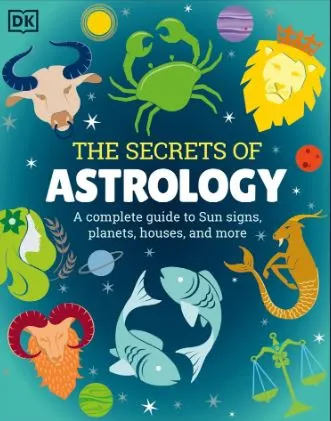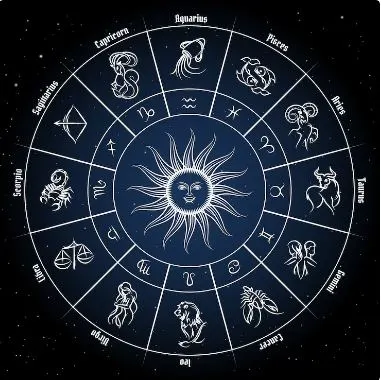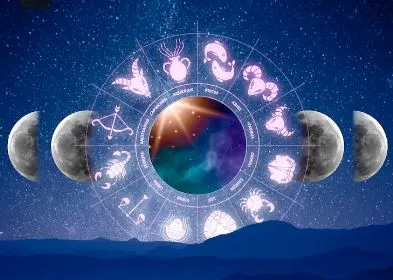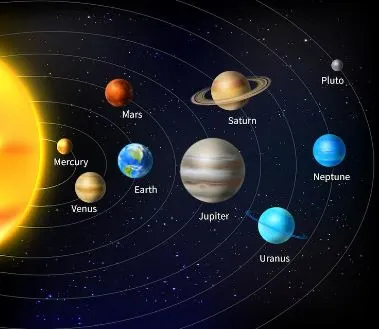Astrology exists as an ancient and perpetual framework that enables people to comprehend cosmic realities and their cosmic position. Through the ages humans have directed their eyes to the skies to uncover meanings and receive guidance and predictions regarding life events and the surrounding universe. People worldwide accept astrology as a fundamental cultural component although it faces constant opposition from scientific researchers. The practice affects how individuals perceive their identity and influences political systems as well as religious beliefs and medical practices. This paper conducts an intricate examination of astrology that covers its historical development and intellectual bases, principal methods, technical applications, social impact, academic objections and the role astrology plays in current society.

👉Defining Astrology: Nature and Significance :-
People who practice Astro use celestial body positions and movements to read and explain terrestrial events together with life events of individuals. According to the basic premise of Astro there exists an intelligible link which unites the cosmic realm of the universe with the earthly realm of human existence. According to this cosmic principle the patterns above correspond to patterns found below.
Astrology stands distinct from astronomy and stargazing because it applies meaningful symbolism and causal effects to space objects in the universe. People who believe in Astro interpret these cosmic messages to understand themselves and their future as well as the patterns of transformation in life.
👉Historical Evolution of Astrology :-
⏩Ancient Origins: Mesopotamia and Egypt :-
The origins of Astro extend back to the ancient Mesopotamian times when the Babylonians formulated the earliest system of celestial observation some time before 2000 BCE. According to them, planetary motion and eclipses were signs or omens that had some connection to the destiny of kings and empires. Babylonian astrologers by 600 BCE had partitioned the sky into twelve areas, leading to the invention of the zodiac—a framework that would play a key role in Western astrology.
Astrology was also contributed by the Egyptians, who utilized star cycles to design calendars and systems of timekeeping. Egyptian priests were significant in combining Babylonian and Greek astrological concepts and formulating the system used today.
⏩Greek and Roman Refinement :-
Greek philosophers, particularly Claudius Ptolemy, systematized and developed Astro from 400 BCE to 100 CE. Ptolemy’s “Tetrabiblos” became a seminal work, setting the zodiac, planetary influence, and the idea of personal horoscopes. The Greeks linked celestial motion with personality and destiny, establishing the notion that astrology could show individual fates.
The Romans welcomed Astro with open arms, incorporating it into daily life and governance. Emperors frequently consulted astrologers for advice regarding war, politics, and even personal affairs.
⏩Astrology in India and China :-
Astrology evolved on its own in India as “Jyotish” or Vedic astrology, more than 3,000 years old. It incorporated Greek astrology with cultural interactions and became both similar and distinct. Chinese astrology, having its origins in the Han Dynasty, formed its own system with lunar cycles, celestial stems, and earth branches.
⏩Medieval, Renaissance, and Modern Transformations
Astro thrived in medieval Europe and the Islamic world, affecting medicine, philosophy, and science. Astro was at its peak of popularity during the Renaissance, with thinkers such as John Dee and Nostradamus practicing and upholding its principles. The development of empirical science in the 17th and 18th centuries, however, caused Astro to lose its status as a serious academic pursuit.

👉Core Principles and Components of Astrology :-
⏩The Zodiac :-
The zodiac is a ring of twelve constellations around which the Sun, Moon, and planets seem to travel throughout the year. Each of the zodiac signs covers 30 degrees of the 360-degree ecliptic and is connected with certain personality characteristics and symbolism.
⏩The Planets :-
Astro regards the Sun, Moon, and planets as “planets” for the purpose of interpretation. Each possesses symbolic meanings and rules over areas of personality and experience.
⇒ Sun :- Essential identity, energy, ego
⇒ Moon :- Feelings, instincts, unconscious
⇒ Mercury :- Communication, intellect, logic
⇒ Venus :- Love, beauty, harmony
⇒ Mars :- Motivation, aggression, action
⇒ Jupiter :- Expansion, luck, philosophy
⇒ Saturn :- Discipline, order, limitation
⇒ Uranus, Neptune, Pluto :- Contemporary additions, symbolizing innovation, spirituality, and transformation, respectively
⏩The Houses :-
A natal chart is broken down into twelve “houses,” each of which is a sphere of life, including self, wealth, communication, home, creativity, work, relationships, transformation, philosophy, career, friendships, and the subconscious. The placement of planets within these houses at birth is believed to shape the experiences and personality of the individual.
Examples:
⇒ First House (House of Self) :- Personality, physical appearance, the way you present yourself to the world
⇒ Eighth House (Transformation) :- Sex, death, rebirth, intense emotional attachment
Ninth House (Philosophy) :- Higher education, religion, travel, wisdom
⏩Aspects :-
Aspects are the angular relationships between planets in a chart. They are an indication of harmony or tension and are important for horoscope interpretation. Most significant aspects are conjunction (0°), opposition (180°), square (90°), trine (120°), and sextile (60°).
👉Types and Branches of Astrology :-
Astrology has branched out into many systems and branches, each with its own approach and cultural background:
⏩Western Astrology :- Tropical zodiac, commonly practiced in Europe and the Americas.
⏩Vedic (Indian) Astrology :- Sidereal zodiac, rooted in Hindu philosophy.
⏩Chinese Astrology :- Lunar cycles, twelve animal signs, and five elements.
⏩Medical Astrology :- Aligns zodiac signs and planets with body parts and diseases.
⏩Electional Astrology :- Identifies the best times for events or actions.
⏩Horary Astrology :- Provides answers to specific questions from the chart cast at the moment the question is posed.
⏩Judicial Astrology :- Forecasts world events and the destiny of nations.
⏩Natal Astrology :- Examines the birth chart to uncover personality and life direction.
Other traditions are Arab, Persian, Celtic, and Egyptian astrology, each bringing special viewpoints and methods.

👉Astrology in Culture, Religion, and Science :-
⏩Astrology and Religion :-
Astrology has frequently been woven into religious thinking. Planets were regarded as gods in the past, with astrological rites following religious ceremonies. Astro is still embedded in Hindu traditions in India and influences significant decisions in life like marriage and work.
Nonetheless, the connection between Astro and religion has been complicated. Monotheistic religions such as Christianity and Islam have sometimes denounced Astro as heretical, while at other times appropriating it within their cosmologies.
⏩Astrology and Science :-
Astrology and astronomy were synonymous for centuries. Astrologers were frequently prominent astronomers, and astrological information helped improve mathematics and observation methods. But the scientific revolution’s focus on empirical evidence and falsifiability caused Astro to fall out of favor as a science. Astro is now regarded as a pseudoscience by the scientific community, as it has no empirical evidence and theoretical plausibility.
⏩Astrology and Medicine :-
Medical astrology was a popular practice during the medieval and Renaissance eras, with doctors employing astrological charts to diagnose disease and select treatments. Each sign of the zodiac was linked to a body area, and planetary positions were believed to affect health and disease.
👉The Practice of Astrology :-
⏩Casting a Horoscope :-
A horoscope is a chart of the heavens at a particular point, normally the time and location of an individual’s birth. The astrologer computes the positions of the Sun, Moon, and planets and examines their alignment in the zodiac and houses in order to offer information on personality, destiny, and cycles of transformation.
⏩Sun Signs and Popular Astrology :-
The most popular type of Astro is the “sun sign” horoscope, which places individuals in one of the twelve zodiac signs depending on their birthday. These horoscopes that can be seen in newspapers and websites provide general information and guidance. Although well known, sun sign Astro is an oversimplification of much more intricate natal chart interpretation.
⏩Synastry and Relationship Astrology :-
Synastry is the astro branch that analyzes compatibility among people by comparing their birth charts. It evaluates the angles and aspects between planets in each individual’s chart to analyze harmony, attraction, and possible relationship challenges.
👉Astrology in the Modern World :-
⏩Enduring Popularity :-
In spite of criticism from scientists, Astro is still in practice and a part of popular culture. Horoscopes, birth charts, and astrologers are consulted by millions for advice on love, work, and self-improvement. Astro has seen a revival in recent times with the help of the internet, social media, and mobile apps, making individual readings available to the masses across the world.
⏩Criticisms and Controversies :-
Critics of Astro contend that it has no empirical basis and that its prophecies are so vague or nonspecific that they cannot be used. No statistically significant relationship has been discovered through scientific research between astrological determinants and personality or events. Nevertheless, the psychological and symbolic significance of Astro remains to retain adherents.
⏩Psychological and Social Functions :-
Astro provides a sense of meaning, order, and connection in a chaotic world. It gives us a language of self-reflection and personal narrative, allowing people to make sense of their experience and relationships. According to some psychologists, astrology’s popularity can be attributed to its capacity to provide comfort, validation, and a model of understanding oneself and others.

👉The Future of Astrology :-
The future of astrology will probably be determined by technology, globalization, and changing cultural values. New technology allows for more accurate and tailored readings, and cross-cultural exchange enhances ancient systems. As spirituality and alternative philosophies increase in popularity, Astro can go on to evolve and flourish both as an individual and communal practice.
👉How Astrology Evolve Over Time :-
Astrology has developed through thousands of years, changing to suit the beliefs, knowledge, and culture of various societies. Its history is a testament to humankind’s lasting interest in the universe and their quest for meaning in the stars. The following is a detailed account of how Astro arose and evolved over time:
⏩Ancient Origins :- Mesopotamia and Egypt
Astrology has its origins in ancient Mesopotamia, specifically Babylon, dating back to around 2000 BCE. The early Babylonians watched the sky, correlating events in the heavens—planetary motion and eclipses—to happenings on Earth and natural catastrophes. By approximately 600 BCE, they had established the initial horoscope system, dividing the sky into twelve equal parts—the zodiac signs.
The Egyptians contributed too, with their system of the calendar derived from astronomical cycles and their employment of groups of stars known as decans in measures of time. Babylonian Astro was blended with Egyptian practice later by Egyptian priests, with consequences for the creation of the zodiac and symbolism of Astro.
⏩Greek and Roman Refinement :-
Astrology was further refined by the Greeks from around 400 BCE. Greek philosophers connected celestial movements with human characteristics and fate, leading to the creation of personal horoscopes. Claudius Ptolemy’s Tetrabiblos (2nd century CE) became a foundational text, establishing much of the zodiac and planetary influence system still used today.
The Romans adopted Astro, promulgating it all over their empire and incorporating it into everyday life and government. Roman rulers frequently sought the advice of astrologers on issues of war, politics, and leadership.
⏩Cultural Exchange and Diversification :-
Astrology evolved separately in India as Vedic astrology (Jyotish) and has been in practice for more than 3,000 years. Greek and Indian systems developed independently, but they influenced each other later on through cultural exchange, particularly after Alexander the Great’s campaigns. The Indian zodiac is similar to the Western zodiac but works on distinct calculations and planetary forces.
Chinese astrology also developed on its own, using lunar phases and a system of twelve animal signs, demonstrating again the extent of Astro throughout the world.
⏩Medieval and Islamic Golden Age :-
During the Islamic Golden Age, Greek astrological works were preserved and enlarged upon by scholars, incorporating Astro with mathematical and astronomical advances. Astrology entered Islamic culture and was further developed during this era.
During medieval Europe, Astro was learned in addition to astronomy and medicine at the universities. It was applied for the diagnosis of disease, as well as selecting treatment and political prophecies.
Astrology knowledge spread widely, particularly with the discovery of the printing press.
⏩The Renaissance and Scientific Revolution :-
The Renaissance period (14th–17th centuries) experienced renewed interest in Astro. There were scholars such as Galileo and Kepler, who engaged in Astro as they contributed importantly to the field of astronomy. Nonetheless, with advances in scientific knowledge—especially with the heliocentric system and the use of empirical techniques—Astro became detached from astronomy and ceased being a learned subject.
👉Modern Adaptations :-
⏩Psychological and Evolutionary Astrology :-
The 20th century saw the turn towards psychological Astro due to the influence of thinkers such as Carl Jung. Astrology came to be utilized as a method of self-knowledge and recognizing psychological tendencies, away from the rigid prediction to personal growth and self-exploration. Evolutionary Astro came to stress later spiritual development and the soul journey.
⏩Globalization and Digital Age :-
Astrology evolved, with Vedic astrology rising in the West and new technology putting personalized readings in everyone’s hands. Now, Astro flourishes in online communities, with apps and websites introducing it to fresh crowds.
⏩Astrology’s Enduring Influence :-
In spite of scientific criticism and absence of empirical evidence, Astro is still culturally relevant. Horoscopes are read by millions for advice, and Astro is employed as a means of self-reflection, spirituality, and entertainment. Its symbolism and archetypes continue to influence art, literature, and popular culture.
The history of astrology’s evolution is proof of its adaptability and persisting popularity. From omens in ancient times to contemporary self-help, it has repeatedly renewed itself, adapting to humanity’s shifting relationship to the universe and search for significance.
https://www.astrology.com/us/home.aspx
👉Conclusion :-
Astrology is a rich and complex tradition, involving history, philosophy, symbolism, and practice. Its continued existence throughout cultures and centuries speaks to humanity’s profound desire to connect—with the universe, with one another, and with ourselves. Whether as a symbolic language, a means of self-knowledge, or a contentious pseudoscience, Astro is a compelling window on the human search for meaning.
💬Disclaimer :-
This Blog provides general information as an educational source only. The author uses their life experiences together with personal viewpoints to create all content. The author accepts no responsibility for damages or losses when users apply this information. The website information depends on your individual acceptance of personal risk when you use it. The information does not serve as professional guidance, so readers need to seek proper professional advice before implementing decisions from the provided content.
hi
Hey Buddy…what’s up!!! Hope you like the article.